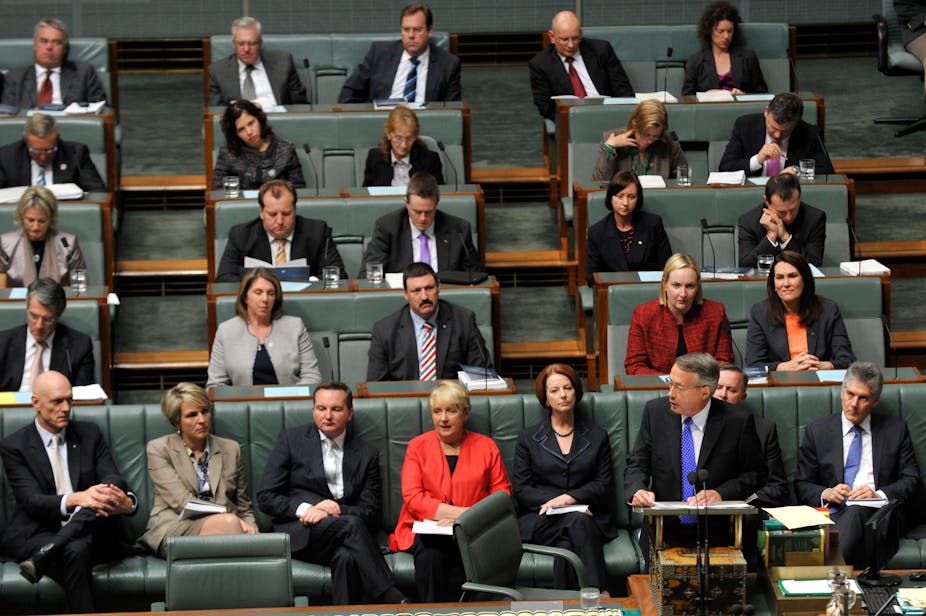“Walk into the local pet shop and the resident galah will be talking about microeconomic reform.” So Paul Keating once famously quipped about the significance of the government’s microeconomic reform agenda to the national pysche. Well if the resident galah is still alive and talking now Wayne Swan is Treasurer there are two different words on his lips - “budget surplus”.
The cornerstone of the Treasurer’s budget commitment - and one of its primary selling points - is to return the economy to a surplus of $1.5 billion in the year 2012-2013. This promise will, the Treasurer announced in his budget speech, be delivered “on time, as promised and ahead of every other major advanced economy”. This promise is designed to demonstrate the government’s commitment to sound economic management. It is also aimed at showing the strength of the Australian economy at a time when European and other Western economies suffer under the weight of recession and crippling levels of government debt.
The question, though, is do any of the “working families” who the budget is targeted towards actually care about the government’s proposed surplus? In the same way that Paul Keating’s focus on the intricacies of economics such as microeconomic reform led him to lose touch with mainstream Australia, has Wayne Swan similarly lost touch with what average Australians are interested in?
Although inflation is low, and housing prices and interest rates are also falling, many Australians still feel burdened by cost of living pressures. These pressures are reinforced in the psyche by the advent of the carbon tax and the well-publicised threats to manufacturing and retail jobs in states that haven’t been reached by the mining boom.
The difficulty the government and Treasurer faced was that its statements in previous budgets showed an almost messianic commitment to returning the budget to surplus. Any divergence from these commitments given the already parlous state of the government’s credibility would have further shattered the Labor brand.
Despite this attempt to bolster Labor’s public credibility ABC 7.30’s Special Report on the budget still opened with the query – “Can Wayne Swan deliver the surplus on time as promised?” This query would seem a legitimate one given the blowout in last year’s budget deficit. Yet it also reflects the government’s failure to sell its credibility on any issues to the Australian media and public. As the public relations specialists say, your management of current issues depends on how credible your perceived handling of previous issues has been. In this area, for a variety of reasons, the government has been found wanting.
There is another reason, however, to suggest that the Treasurer is barking up the wrong tree when it comes to emphasising the power of the surplus and credentials of economic management to transform the government’s public image. Studies have suggested that people have different expectations of conservative as opposed to Labor governments.
While conservatives are generally perceived as good economic managers and fiscally responsible, Labor governments are perceived as better at dealing with issues such as education, health and social welfare. These perceptions are thought not to change easily over time despite the individual record of the particular government in power.
In seeking to challenge conventional wisdom at a time when his party already suffers from a pre-existing credibility gap, Wayne Swan may thus be setting himself an insurmountable task.
Recognising that the Labor brand requires attention to the core issues of health, education and the welfare of lower and middle-class families, Swan introduced his $3.6B package designed to “spread the benefits of the mining boom.”
Payments to families, a National Disability Insurance Scheme, more money to public hospitals and a reduction in dental health waiting list were all part of these appeals to “core Labor values”. Taking money from the rich through such things as crackdowns on executive perks and scrapping company tax reductions was designed strategically both to pay for the family package and further align the government with the “battlers” in Australian society.
Having said all that, one could easily ask the question: Does the budget matter given Federal Labor’s parlous state in the opinion polls? Experienced political market researchers I know have told me they have rarely, if ever, seen the level of anger, as opposed to antipathy, directed to a federal government in the focus groups they run. Such rusted-on resentment is unlikely to be easily changed by macroeconomic policy aimed at achieving a surplus as well as some budget sweeteners.
One could more plausibly argue that Wayne Swan’s budget is designed in an attempt to preserve the Labor brand for future generations of Labor leaders. In the face of the near obliteration of the Queensland party at the recent state election and the similar calamity that could very easily befall Federal Labor at the next election, Swan had to do something to prevent the party from being unelectable for many years to come.
John Howard, after all, was able to limit the Liberal Party to a 28-seat defeat at the 2007 election. This margin enabled the Tony Abbott-led opposition to come agonisingly close to victory in 2010. The 55-seat defeat of the Whitlam government in 1975 on the other hand ushered in a more sustained period of conservative political dominance.
It remains to be seen whether Swan’s political strategy to sell his budget will have any significant effect on Labor’s political fortunes, both for now and for future generations of labor leaders.

